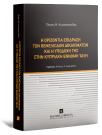A.-K. Dimopoulou, The Εxecution of Judgements of the European Court of Human Rights, 2019

The implementation of judgments constitutes one of the pillars of the Rule of Law and is inextricably linked to the quality of the administration of justice. From this starting point and keeping in mind that selective enforcement results in selective justice, the present paper focuses on the execution of judgments of the European Court of Human Rights (ECtHR). The paper attempts to look into the complex question of the binding effect that judgments have on Member States. Is the effect actually binding or does it on occasion remain “wishful thinking”? The study aims at examining the interrelated dimensions of the above-mentioned issue. To this end, it is divided into five parts. The first one focuses on pertinently presenting the existing implementation mechanism of the ECtHR’s judgments and reflecting on the role assumed by the political bodies engaged in the process. The second part examines the evolution of the implementation mechanism under the prism of the ECtHR’s jurisprudence. The third part is concerned with the underlying causes relating to the problem of defective or non-implementation including the ones encountered in interstate affairs. In the fourth part emphasis is put on the impact of the implementation of ECtHR judgments in the Greek legal order, as well as on reasoning on the way the supranational legislative text has affected the domestic practice and legislation, while adducing specific examples. In view of the fact that slow or non-implementation is a sore point in the Convention’s system, the study finally contemplates on potential means of amelioration that could endorse the effectiveness of the implementation system.
Πληροφορίες έκδοσης
Πίνακας περιεχομένων +-
Abstract
Abbreviations
Introduction
PART
The implementation mechanism of the judgments of the ECtHR
1. The notions of restitutio in integrum and just satisfaction
1.1 Towards a consistent practice of restitutio in integrum
1.2 The award of just satisfaction
1.3 Grant of pecuniary and non-pecuniary damages
2. The main bodies involved in the implementation mechanism of the ECHR
2.1 The function of the Committee of Ministers
2.2 The potential expulsion of Member States by the Committee of Ministers.
2.3 Reforms regarding the role of the Committee of Ministers: Recent developments regarding the initiation of infringement proceedings
2.4 Reflections on the involvement of the Committee of Ministers in the execution of judgments
2.5 The role of the Parliamentary Assembly of the Council of Europe
PART
The evolving course of the existing implementation mechanism under the ECtHR’s jurisprudence
1. Redress in the ECtHR - The required measures
1.1 Individual measures
1.2 General measures
1.3 Departure from the declaratory nature of the Court’s judgments
1.4 The extent of the Court’s competence
2. The pilot judgment procedure: its contribution to the implementation mechanism
2.1 Objectives
2.2 Weaknesses of the pilot judgment: extension of the timeframe
2.3 Judgment in Burmych and others v. Ukraine: signs of regress?
PART
“Pathologies” in the execution of judgments
1. The non-execution of judgments in the Member States of the CoE
1.1 Limits to the binding effect of the judgments of the Court
1.2 The effect of res interpretata
1.3 Mapping the underlying reasons for defective or non-implementation of the ECtHR’s judgments
1.4 Political reasons and the inclusion of new Member States
1.5 Monistic and dualistic approach
1.6 Financial reasons
2. The particularities in the execution of interstate affairs
2.1 The scope of interstate applications
2.2 The Court’s jurisprudence in cases of armed conflicts
2.3 Just satisfaction in interstate cases
2.4 Alternative value of interstate cases
PART
The impact of the ECtHR judgments on the domestic legal order: An insight to the Greek paradigm
1.1 Constitutional amendments
1.2 Systematisation of legislative amendments and adopted general measures in response to the Court’s judgments
1.3 The implementation of the judgment of the Strasbourg Court by the Greek judge
PART
Reflections on how to ensure the long-term effectiveness of the system
1.1 Prospects and challenges
1.2 The entry into force of Protocol 16: a challenge for the judicial dialogue
1.3 The adoption of sanctions
Concluding Remarks
Annex: Interview with Christos L. Rozakis, Emeritus Professor of the National and Kapodistrian University of Athens, former judge and Vice-President of the European Court of Human Rights
Bibliography






















